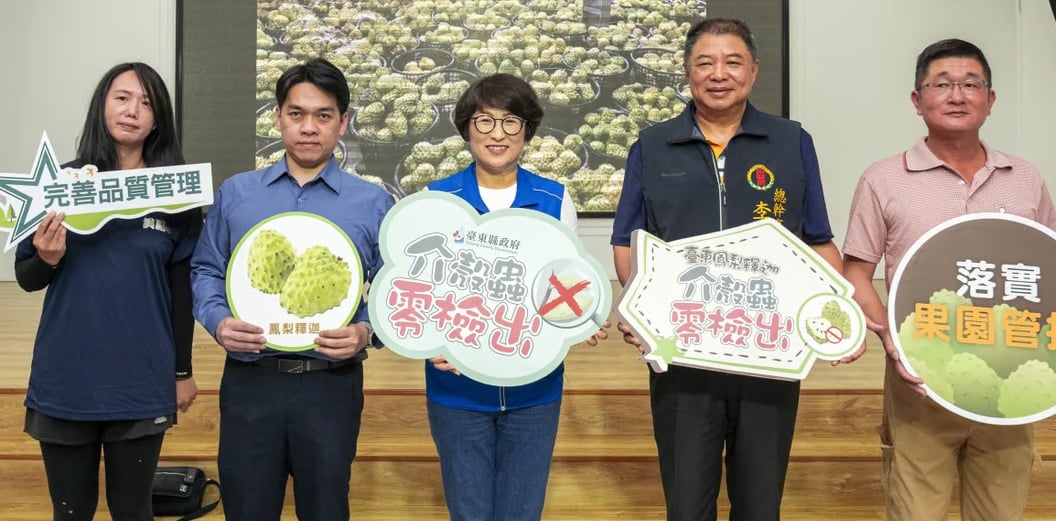June 5, 2025 | 19:10 GMT +7
June 5, 2025 | 19:10 GMT +7
Hotline: 0913.378.918
June 5, 2025 | 19:10 GMT +7
Hotline: 0913.378.918

Taitung county magistrate Rao Ching-ling (centre) poses with National Taitung University Professor Lee Chun-lin (to her left) and representatives from the sugar-apple trade with signs advocating the fruit is safe to eat. Photo: Taitung county government
It came after a meeting with mainland officials and a Taiwanese county magistrate and the vice-chairman of the island’s opposition Kuomintang party over the weekend, with businesses in Taiwan pushing for further lifting of import bans imposed by Beijing, sources told the Post.
The Taiwan Affairs Office of the State Council in Beijing confirmed the lifting of the ban after mainland China had cut off imports of the sweet fruit, that is also known as atemoya or custard apples, in September 2021.
Mainland Chinese officials previously pointed to biosafety fears and possible pests, while Taiwan said the claims lacked “scientific proof”.
Kuomintang party vice-chairman Andrew Hsia and Taitung county magistrate Rao Ching-ling had expressed a “strong wish” to resume the trade during the meeting over the weekend, said Taiwan Affairs Office spokeswoman Zhu Fenglian.
They have also “organised” farmers to improve quality to guarantee safety, added Zhu, while the fruit must come from “registered” orchards and packagers.
Mainland Chinese officials have been cutting imports of Taiwanese fruits and seafood over the past two years, tracking a downward spiral in cross-strait relations.
Beijing views the self-ruled Taiwan as a breakaway territory that must be reunited, by force if necessary. Following a visit by former US House speaker Nancy Pelosi to the island in August, mainland China banned imports of some Taiwanese products.
Import of pineapples and wax apples were banned in 2021, with citrus fruits also prohibited in August, although Beijing lifted a ban on Kinmen Kaoliang Liquor in January.
Sugar-apples grow on 2,800 hectares (6,919 acres) in Taitung county, which lies in southeastern Taiwan, county figures showed.
A total of 4,355 tonnes were exported worldwide between December 2021 and April 2020, the data showed.
Sugar-apples contribute 20 to 30 per cent of Taitung’s economy per year.
Taitung county magistrate Rao asked mainland Chinese officials at the 15th Straits Forum over the weekend about resuming fruit imports, including sugar-apples and pineapples, said Joanna Lei, a former Taiwanese lawmaker who attended the event in Xiamen.
“She got a commitment saying they would be able to resolve this issue,” said Lei, who is also chief executive of the Chunghua 21st Century think tank in Taiwan.
Overall, she said, most participants at the forum “were hoping cooperation will continue”.
The county government has worked with a local university over the past two years to “improve the safety” of sugar-apples to meet mainland standards, a county spokesman said.
The Straits Forum aims to promote deeper economic integration with Taiwan, and around 5,000 people are set to attend the 15th edition, which kicked off in Xiamen on Saturday.
President Xi Jinping sent a letter to the forum on Saturday saying that Beijing would “promote cross-strait economic and cultural exchanges”, the state-run China Daily said.
“Any kind of dialogue is pretty important now, since we’re at a point of very strained cross-strait relations,” said Chao Chien-min, dean of social sciences at the Chinese Cultural University in Taipei.
“People recognise now that the politicians can’t open a channel. This kind of people-to-people dialogue indicates that the mainland wants to show that things can be worked out in this way.”
(SCMP)

(VAN) With the war ongoing, many Ukrainian farmers and rural farming families face limited access to their land due to mines and lack the financial resources to purchase needed agricultural inputs.

(VAN) Vikas Rambal has quietly built a $5 billion business empire in manufacturing, property and solar, and catapulted onto the Rich List.

(VAN) Available cropland now at less than five percent, according to latest geospatial assessment from FAO and UNOSAT.

(VAN) Alt Carbon has raised $12 million in a seed round as it plans to scale its carbon dioxide removal work in the South Asian nation.

(VAN) Attempts to bring down the price of the Japanese staple have had little effect amid a cost-of-living crisis.

(VAN) Fourth most important food crop in peril as Latin America and Caribbean suffer from slow-onset climate disaster.

(VAN) Shifting market dynamics and the noise around new legislation has propelled Trouw Nutrition’s research around early life nutrition in poultry. Today, it continues to be a key area of research.